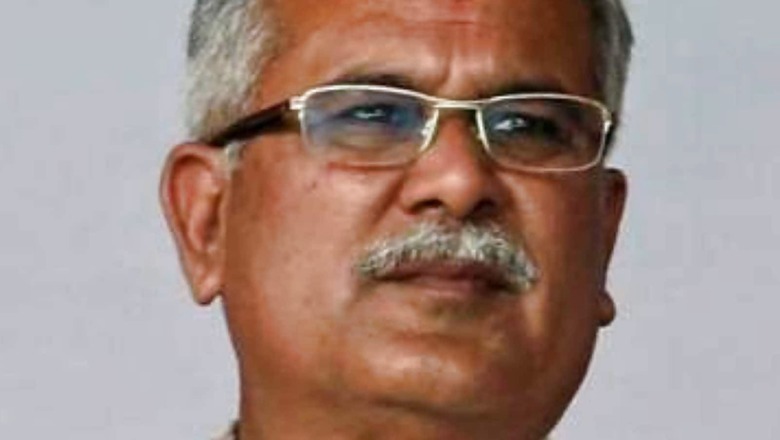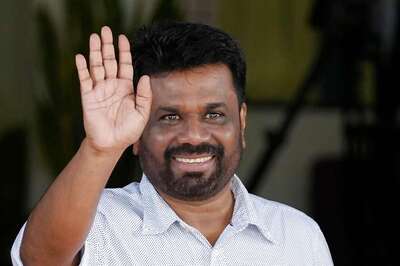
views
Political circles in Raipur are both intrigued and surprised by the sudden turn of recent events. At a time when Congress chief minister Bhupesh Baghel appeared firmly in the saddle, his recent appointment with Rahul Gandhi in the company of arch-rival and Chhattisgarh minister for health T.S. Singh Deo in New Delhi has triggered a fresh round of speculation on whether a change of guard is on the cards.
T.S. Singh Deo, a quintessential politician, did not act aggressive like Sachin Pilot or turned rebellious. Instead, for past few months, he has been pleading, aiming at Rahul’s guilty conscience (if there is one) to position himself in Baghel’s chair.
Rahul Gandhi, if he considers changing the chief minister of Chhattisgarh, needs to ponder why similar commitments made to Jyotiraditya Scindia and Sachin Pilot in 2018 were not honoured. And why the opinion of Congress MLAs has not been sought in Raipur, Jaipur or Chandigarh—in Punjab, the battle of one-upmanship between Navjot Singh Sidhu and chief minister Captain Amarinder Singh has almost reached a point of no return.
Any attempt to dislodge Bhupesh Baghel at this juncture would be inexplicable. He is a grassroots leader, who belongs to the powerful OBC community and commands a reasonable degree of popularity in Chhattisgarh. At a time when the BJP is tightening its grip over OBCs or Other Backward Classes across the country and the demand for a caste-based census is on the rise, removing an OBC chief minister may create more problems for the Congress than resolving them.
Baghel, it is learnt, has been advised to remove a couple of ministers who reportedly had ‘misbehaved’ with Singh Deo. Baghel would not mind sacrificing his ministers but the gesture, at ground zero, would be interpreted as a sign of weakness or fall in his standing in the Delhi durbar.
Baghel as CM and Congress Strategist
It is surprising that the talk of a change of guard has become shriller when Baghel has initiated a series of programmes to consolidate the Congress’ hold in the state, which is dominated by backward castes, tribals and weaker sections. The Chhattisgarh government has recently decided to provide subsidies to the private sector to set up hospitals in rural areas. As we understand, the availability of specialist doctors in rural areas remains a challenge, more so during the testing COVID-19 times. Any attempt to expand the health infrastructure across the state to prepare for the future waves of the coronavirus pandemic is welcoming. The move, however, was opposed by Singh Deo.
ALSON READ | Purge or Compromise? Congress is Facing Hobson’s Choice in Punjab, Rajasthan and Chhattisgarh
Several other innovative schemes have been launched by the Chhattisgarh government. Last year, the government announced that it would procure cow dung from farmers which, in turn, would be used to produce vermicompost worth over Rs 2,300 crore. Cattle and livestock have a deep, intrinsic link with the Indian economy, particularly in rural areas. Artha [economy] and dharma [religion] have worked hand in hand; Mahatma Gandhi’s idea of gram swaraj had both elements. The move to purchase cow dung from farmers was meant to not merely boost their livelihood but also offer a better environment, increase land fertility and ensure crop protection.
In April this year, the Congress under Rahul Gandhi’s supervision had opted for a ‘first-of-its-kind’ experiment during the Assam Assembly polls. The outcome of the assembly polls on May 2 did not live up to the expectations but Baghel and his team had given their 100 per cent to micro-manage elections in another state. By the time the campaigning ended in Assam on April 4, Baghel had addressed 38 public meetings in Upper Assam, Barak Valley and Lower Assam. The presence of about 700 political activists who had camped in Assam from January to early April 2021 did make some impact—local party workers were trained on booth management, social media, talking points, coordinating with allies and a range of other issues.
Is Removing Baghel the Right Move?
The key question is: was a vague 2.5-year formula floated between Bhupesh Baghel and T.S. Singhdeo in December 2018 when the Congress picked Baghel as the chief minister of Chhattisgarh? Was it a Rahul Gandhi commitment, was a verbal or written record kept? These questions assume importance as Singh Deo has constantly been asking for his share of the term and AICC general secretary in-charge P.L. Punia has denied any knowledge of it, supporting Baghel’s contention.
Congress insiders add another dimension to the story. They say even if Rahul at that point in time had informally indicated a sharing formula, this understanding does not have a legal sanctity. If the political exigencies do not demand a change of guard, there are other avenues to tame or placate Singh Deo who incidentally does not have much of a support base in the Congress legislature party.
Apparently, there are some other elements adding fuel to the Chhattisgarh crisis. Fingers are being pointed at a close Rahul Gandhi aide as well as those interested in the mining sector trying to force a change of guard.
Interestingly, a recent report by Nistula Hebbar, political editor of The Hindu, says the BJP is making renewed bid to play the OBC card in Chhattisgarh, which could mean “end of the road for Mr Raman Singh”. Singh, a Rajput, was the chief minister when the BJP ruled the state between 2003 and 2018.
With the Congress already in a firefighting mode in Punjab and Rajasthan, the big question is if it is politically prudent for the Gandhis to open another front in Chhattisgarh purely on the grounds of vanity when realpolitik demands honest change.
The author is a senior journalist. The views expressed in this article are those of the author and do not represent the stand of this publication.
Read all the Latest News, Breaking News and Assembly Elections Live Updates here.




















Comments
0 comment